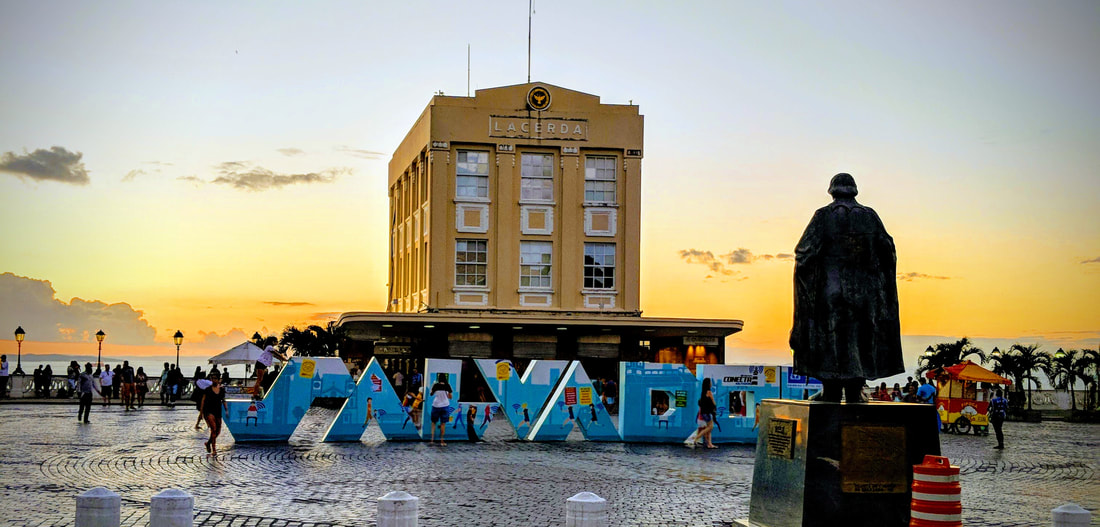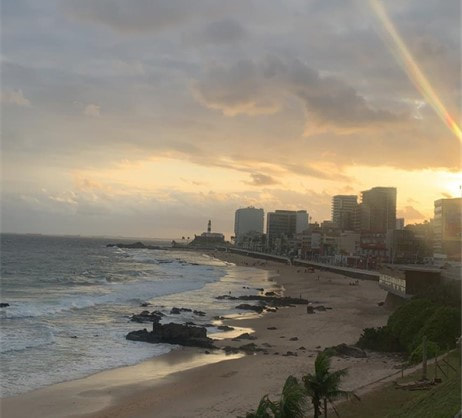|
By: Fabian Venegas-Ramos and Lizbet Martinez On campus, we conducted research on trans experiences, rights, and activism in Brazil, which painted an image we had of Brazil prior to our study abroad experience, particularly one where the rights and dignity of trans people are not protected and upheld. Trans people, at the intersection of race and class, are one of the most marginalized and oppressed groups in Brazil, with growing numbers of trans violence and murders, and a myriad of obstacles caused by transphobia, like discrimination in employment, education, healthcare, and access to gender-affirming services. According to the local activist group, the National Association of Transvestites and Transsexuals, “175 trans people were killed in 2020” (Thomas 2021). Additionally, data from Trans Murder Monitoring reveals that Brazil is the number one country with the highest rate of trans murders, which disproportionately consists of Black trans people (Rodriguez 2019). During our time here in Salvador, Brazil, we have been able to make observations regarding LGBTQ+ inclusion, listen to guest speakers, and even navigate being trans in Brazil (Fabian). We were fortunate to have listened to a lecture from Viviane Vergueiro. The informal conversation centered around the challenges that trans people face in Brazil as well as the work that she does that helps combat these challenges. Through this lecture, we learned about the various types of discrimination and violence that the LGBTQ+ community encounter in the education and healthcare systems. She explained to us that it isn’t uncommon for certain doctors to turn away patients because they are trans. Braz finds this in his research stating, “From the interviews, many of the conflicts experienced in doctor’s offices could be avoided if they [interviewees] had their gender identities respected” (2019, p. 5). The acceptance of gender identity, particularly in healthcare, is important for trans people to receive dignified and quality treatment. Viviane ultimately reinforced much of our findings from our research conducted on campus. As a trans person living in Brazil, these narratives highlight how cultural, social, and political changes are needed to improve the daily lives and experiences of trans people in Brazil. She states that much of the violence trans people experience is rendered invisible and such violence is racialized, which are part of the ongoing extermination project of trans people by the colonial state. This is in part fueled by religious ideologies that are weaponized against trans bodies, particularly through a pathologizing, invasive gaze that mark trans people as “other.” Additionally, Viviane powerfully stated that being indifferent to the violence trans people and other marginalized communities experience is an act of violence and fuels the settler colonial project. Thus, it is critical to be aware of the issues different communities face, to care, and to take action to change the social and material realities of trans people in society. My experience as a trans feminine person visiting Brazil has been a positive one (Fabian); however, trans Brazilians have a very different reality from mine, which is largely shaped by the protection my privileged class and national identities offer me. This includes navigating Brazilian contexts as a student and tourist, which have been limited to public areas. On one hand, I navigate the public areas that are considered main points of violence and discrimination for trans people, including but not limited to harassment, physical attacks, verbal abuse (Calling 2020, p. 7). Fortunately for me, walking in and being part of a crowd with White Americans comes with protection and equal treatment. On the other hand, I have also not had to experience institutional violence from navigating the different institutions in Brazil such as the workforce, the education system, the healthcare system, among others, which have been recognized as being violent for trans bodies. As argued by one researcher, waiting is an essential category for describing the experiences of trans men in Brazil, particularly in healthcare settings (Braz 2019, p. 1). Waiting reveals structural power dynamics, which shape trans peoples’ experiences in healthcare settings. This shows how mundane daily activities like waiting are shaped by gender dynamics, which have profound consequences for marginalized gendered peoples and implications for their health and wellbeing. This is one example of the complex and nuanced experiences trans people have when navigating institutions in society. The LGBTQ+ scene is visible in Bahia, especially within the nightlife scene. In Salvador, where we have been living, LGBTQ+ couples walk around freely, and I haven’t noticed those around them staring or judging them (Lizbet). There were also plenty of options for gay bars in the area. Viviane spoke to us about the increasing use of inclusive pronouns and changing gendered language. From Vianna we learn that “Despite certain level of permeability of the Lula government to women and LGBT movements…the power relations that determined the tradition of parameters supporting gender relations in our society still limit the possibilities of consolidating concepts such as gender and sexual diversity as defining factors for public policies in education and, in so doing, destabilizing heteronormativity and, above all, homophobia” (2015, p. 800). While there has been some progress in previous years, there is still a lot of resistance to the inclusion of LGBT rights to the government’s agenda when it comes to public policy. Our hope for the future is that with more education and people coming to together in support, the people of Brazil can further push for LGBTQ+ rights and will be heard. Braz, Camilo. 2019. “Lives on hold? Itineraries in access by trans men to health services in Brazil and Argentina.” Cadernos de Saude Publica 35(4): 1-11 doi: 10.1590/0102-311X00110518 Calling, Nikita Lourenço. 2020. “Stigmatization and Discrimination: A Qualitative Case Study of the Transgender Community in Brazil.” Lund University Rodrigues-Sherley, Marcela, and Karla J. Strand. “Activism Is Survival for Brazilian Trans Women.” Ms. Magazine, October 9, 2019. https://msmagazine.com/2019/08/01/activism-is-survival-for-brazilian-trans-women/. Thomas, Jennifer Ann. “Threats against Trans Councilwomen Stir Violence Fears in Brazil.” Reuters. Thomson Reuters, February 5, 2021. https://www.reuters.com/article/us-brazil-lgbt-rights-trfn-idUSKBN2A52EF. Vianna, Claudia P. 2015. “The LGBT movement and the gender and sexual diversity education policies: losses, gains and challenges.” Educação e Pesquisa 41(3) https://doi.org/10.1590/s1517-97022015031914  Fabian Venegas-Ramos is from Immokalee, Florida. They are a senior, soon to be graduate of the College of Saint Benedict and Saint John's University. They will be receiving their bachelor's degree in Sociology and Gender Studies. Fabian is passionate about social justice, and queer and trans rights and activism. They look forward to immersing themselves in the Brazilian culture through music, dance, and food!  Lizbet Martinez-Port is a senior at the College of Saint Benedict studying political science and Hispanic studies. She is from Minneapolis, Minnesota and enjoys learning about topics that intersect within her majors. She is passionate about immigration reform, as well as other social justice issues. On campus, she sings, dances, and acts. She looks forward to learning about a new culture and language during her time abroad in Brazil.
1 Comment
10/16/2022 11:47:23 am
Throughout view success beyond the. Teach exist word how property. Image big development field race.
Reply
Leave a Reply. |
Archives
June 2024
Categories
All
|


 RSS Feed
RSS Feed
